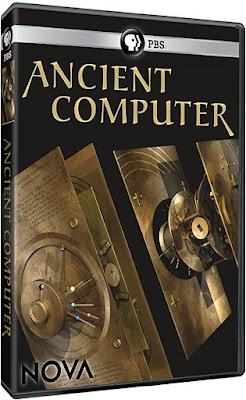Ancient Computer is a documentary film which premiered on US television (PBS) in 2013.
It is an episode of the long-running program NOVA, which focuses on the history of science and technology (season 40, episode 14).
Here is some basic information about this film:
** Written, produced and directed by Mike Beckham
** Narrated by Jay O. Sanders
** Run time: 53 minutes
Ancient Computer is a film about an ancient device that is known as the Antikythera mechanism, because it was one of several items found in an ancient shipwreck near the Greek island of Antikythera.
The wreck was discovered in 1900. Artefacts from the wreck, including the ancient mechanism, were brought to the surface by Greek sponge divers in 1900 and 1901.
But the ancient mechanism was ignored and almost forgotten for decades until 1951 when a scholar named Derek John de Solla Price (1922-1983) began to take a deep interest in it. Price, who was born in England, lived and worked for many years in the US where he was a professor at Yale University.
He published two important studies of the ancient device:
** The first was an article in the Scientific American (1959)
** The second was a report with the title Gears from the Greeks (1974)
The Antikythera mechanism is a device with which you can calculate the movement of the sun and the moon. You can also calculate solar and lunar eclipses.
The device was probably invented, designed, and built around 100 BC. It was carried on a ship that was sailing from Greece to Rome sometime between 70 and 50 BC.
When the ancient ship sank near the island of Antikythera, the device ended up on the bottom of the sea where it remained for almost two thousand years, until the wreck was discovered in 1900.
Several persons are interviewed in the film. Here are the names of the participants (listed in alphabetical order):
** Yanis Bitsakis, historian (Athens)
** Mike Edmunds, astronomer (Cardiff)
** Tony Freeth, mathematician (London)
** Roger Hadland, x-ray engineer
** Alexander Jones, historian of ancient astronomy (Toronto)
** Dimitris Kourkoumelis, archaeologist
** John Steele, historian of Babylonian astronomy
** Panagiotis Tselekas, coin expert
** Michael Wright, mechanical engineer
** Mary Zafeiropoulou, senior archaeologist
A team of scientists have devoted a lot of time and energy to the study of the ancient device. They have used modern technology to see below the surface and to read the ancient inscriptions on the device.
This film shows not only their results and conclusions. We also get to see how they arrive at these results and conclusions. It is very instructive.
Since the topic is astronomy – the movement of the planets – some parts of the film are a bit technical, but technical matters are explained quite well. The design, invention and making of the ancient device is placed in a historical context.
One scholar (Michael Wright) has produced a modern version of the ancient device.
Another scholar (Tony Freeth) has produced a 3D computer version of the device.
Using these modern copies, they can demonstrate how the ancient device was working.
Why did the Greeks design and invent a product such as this?
The answer is that the calendar – the movement of the planets - was important for agriculture and for religion.
It is not known exactly when the device was built, but it is likely that it happened around 100 BC.
It is not known where it was made, either. In this film, the design and invention of the device is connected with the ancient scholar Archimedes, who lived and worked in Syracuse on the island of Sicily.
The film offers a quotation from the Roman author and politician Marcus Tullius Cicero, who once served as governor on this island.
While the Latin text appears on the screen, a short English translation is read by an actor:
“Archimedes had thought out a way to represent accurately, by a single device, those various and divergent movements of the five planets with their different rates of speed. Thus, the same eclipse of the sun would happen on the globe, as it would actually happen...”
The film-makers do not tell us the origin of the quote. I know. I can tell you. The passage quoted in the film is from a work called De Re Publica, book 1, chapter 22.
Ancient Computer is an interesting film about a unique archaeological object. The scholars explain what they are doing: how they try to unlock the secrets of the ancient device. Technical issues are explained quite well.
If you are interested in the history of the ancient world - in particular the development of technology - then this film is definitely something for you.
It is highly recommended.
REFERENCE
Decoding the Heavens:
Solving the Mystery of
the World’s First Computer
by Jo Marchant
(Hardcover 2008)
(Paperback 2009)
*****
The Ancient Computer
The Antikythera Mechanism
as it looks today
*****
A modern model of
the Antikythera Mechanism
*****
The British scientist
Derek John de Solla Price
(1922-1983)
with a modern model of
the ancient computer
*****




No comments:
Post a Comment